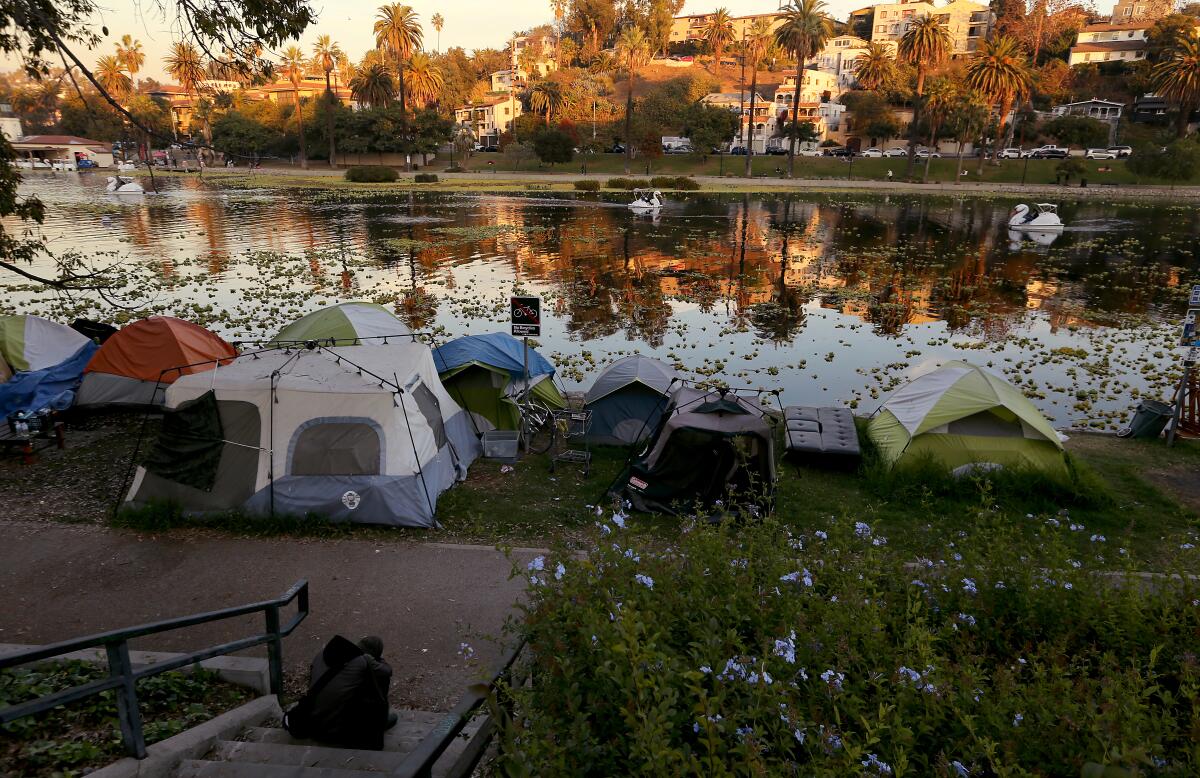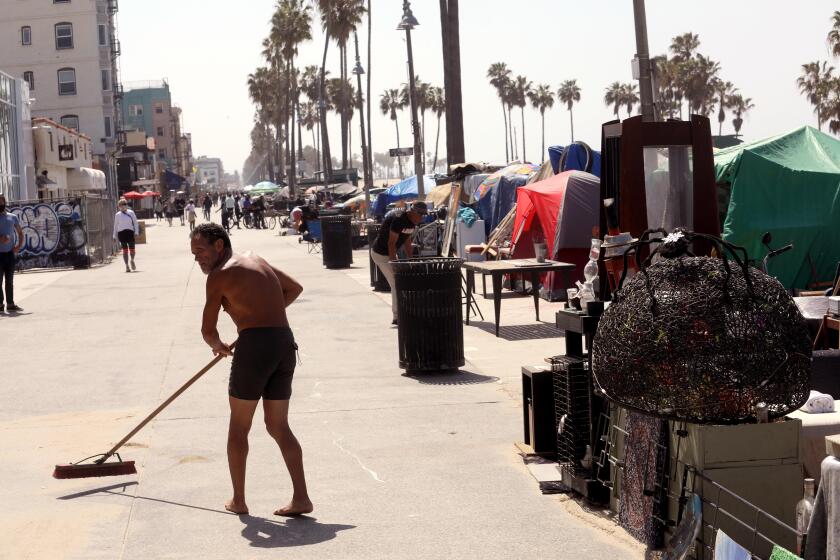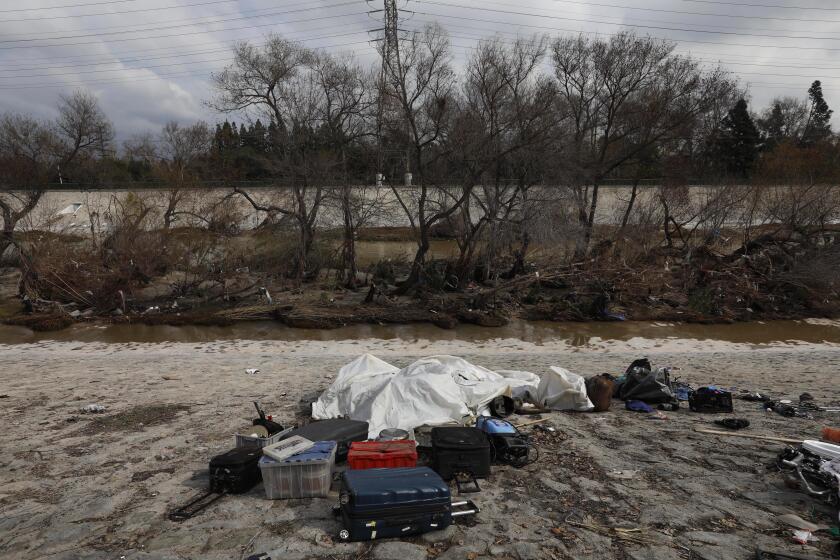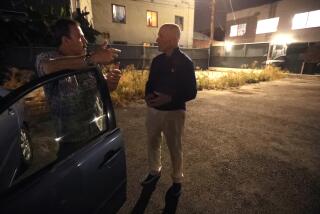Op-Ed: Volunteering with L.A.’s homeless can mean becoming a de facto caseworker

I met J. in 2019, the first time I did homeless outreach. She was living on an island in the L.A. River, hidden by a high wall of arundo reeds. She was bright and bubbly, with a laugh that you could hear across a quarter mile of concrete. I found offering candy bars to unhoused strangers intimidating, but interacting with J. was easy.
Over the years I followed her up and down the river as she was forced to move by winter rains and city cleanup crews. When the pandemic started, I left masks outside her tent. Once she showed me pictures of her kids. Last Christmas I baked her cookies. Volunteers are not supposed to have favorites, but I do and J. is mine.
About six months ago, something inside J. snapped. Formerly social to a fault, she took to isolating herself, surrounded by an increasing collection of detritus. She lost weight and began exhibiting fits of paranoia. Her drug use worsened.
Homelessness is invariably entropic, but the decline is not constant and J. has crossed a precipice.
Three men, in their 50s, 60s and 70s, represent a growing population among L.A. County’s unhoused.
I fear that without help she will end up dead or lost entirely. But J. is not capable of navigating the social service system on her own, and I have found myself, a private citizen without formal training or authority, acting as, effectively, an unpaid service provider.
J. is one of the more than 65,000 unhoused residents of Los Angeles, of whom about 48,000 live unsheltered. The Los Angeles Homeless Services Authority, tasked with addressing this crisis, is not a centralized agency and has limited operational authority. It functions by dispersing money to private service providers, each with their own policies. The resultant chaos is worsened by L.A.’s byzantine political structure and geographic sprawl.
Case managers are underpaid and chronically overburdened, and turnover is so rapid that many unhoused people have never met their case managers. The operating paradigm prioritizes permanent supportive housing over street-level services, and the reality is that L.A. County does not have anywhere close to the amount of this housing to be able to shelter those who currently need it. Statewide, things are equally bleak — at the current rate of construction it will take 40 years to address the lack of housing, which doesn’t account for the inevitable growth of the unhoused population.
In short, it will be a long time before J. will have a place to call her own, and she doesn’t have that time. The quickest way to get her out of her tent is to get her into a temporary housing shelter — a bed and a cubicle in a large public dorm. It’s a small first step, but it will at least ensure her daily safety.
But shelters are operating at decreased capacities because of COVID, and just getting J.’s name on the wait list requires using backdoor contacts I’ve acquired over my time doing volunteer outreach. The process proves opaque, requiring communication with an astonishing array of people.
J.’s intake appointment gets changed, canceled, uncanceled and changed once more. Her phone never works and I find myself at the river almost daily, coordinating the intake process and keeping up her spirits. She can bring only two suitcases into the shelter, and so we spend one boiling Friday afternoon boxing up some of her possessions for storage.
A small confrontation on the bike path at the L.A. River showed how we misunderstand each other and homeless people who are our neighbors.
Every step of this process highlights its brokenness, but still, on the day J. is to move into the shelter I feel uncharacteristically positive. I announce myself from a hole in the fence that serves as J.’s door. When she doesn’t answer, I go inside. Even with what we’ve put into storage there are still shopping bags full of clothes and housewares and broken electronics. After she doesn’t answer a third time, I break an ironclad rule and open J.’s tent without permission.
Finding it empty is like being punched in the stomach — a moment of shock and then a growing ache.
Living on the streets of L.A. means coping with brutal conditions: the ravages of weather, lack of access to hygiene, substance abuse and untreated chronic physical ailments. Theft is constant, and violence, especially against women, is horrifyingly common.
It is madness to believe that living under such conditions would not affect a person, physically and mentally. People who need help aren’t always polite, don’t always say thank you or show up for appointments. This is frustrating, but that is irrelevant. We must stop treating housing and homeless services as if they are rewards for good behavior.
The issue is not whether the people living in your neighborhood encampment are worthy of assistance, but whether they should be living in encampments at all. We have to keep making efforts, for our own sake nearly as much as for the sake of the unhoused. Allowing the most vulnerable among us to die on our streets must diminish the humanity in us all.
When I find J. days later, she is frantically high and penitent as a truant. She explains that she got scared, that she couldn’t stand to leave her stuff behind. She says she knows she has a problem. She says she wants to go to rehab. She says she needs help.
This last is most certainly true.
Daniel Polansky is a writer living in Los Angeles.
More to Read
A cure for the common opinion
Get thought-provoking perspectives with our weekly newsletter.
You may occasionally receive promotional content from the Los Angeles Times.












